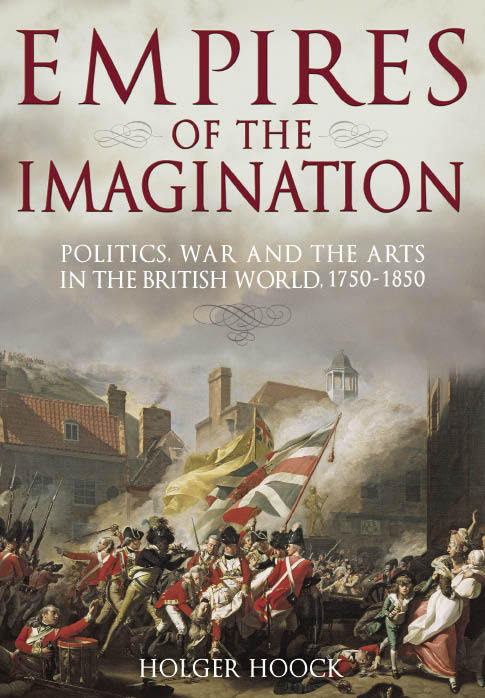The years between the middle of the 18th century and the middle of the 19th century, argues Holger Hoock, ‘saw Britain evolve from a substantial international power yet relative artistic backwater into a global naval, commercial and imperial superpower as well as a leading cultural power in Europe.
The years between the middle of the 18th century and the middle of the 19th century, argues Holger Hoock, ‘saw Britain evolve from a substantial international power yet relative artistic backwater into a global naval, commercial and imperial superpower as well as a leading cultural power in Europe. These developments … were not unrelated.’
Wowsers. That’s one heck of an assertion, and it is no wonder Hoock uses the slightly weasly formulation ‘not unrelated’. But let’s try and work it through. During the years in question, and through a combination of state and royal sponsorship and private patronage, what Hoock calls ‘the culture of power’ and ‘the power of culture’ became intricately intertwined. The Hanoverians and early Victorians had a jolly lot of war and conquest to be getting on with, and the bods in charge were by and large pleased to be doing it. As a result, they made it a vital and selfconscious part of the British imperial project (my term, not Hoock’s) to create a broad, celebratory cultural framework to support it.
Thus the narratives of the loss of the American colonies, war with Napoleon, the continuity of the monarchy and Indian rule all fed into one another and gained coherence through the forging of a dazzlingly patriotic national cultural identity. This was expressed through art, architecture, music, pageant, theatre and exhibitions. Recurrent themes were warfare, heroism, Christian valour, patriotic sacrifice, and the triumphant march of British history. Great treasures — the most famous being the Parthenon (Elgin) marbles — were plundered from around the globe and displayed to an enthusiastic public. Enormous public works and national monuments were erected, culminating right at the end of Hoock’s period with Trafalgar Square and the Barry/Pugin Palace of Westminster.
Perhaps my favourite anecdote in a book chock full of vivid case studies draws several of the strands together. Hoock discusses at length the development of St Paul’s Cathedral as the home of the British military pantheon:
The limits … seemed to have been reached when some proposed to erect Nelson’s monument under the centre of the dome, preferably raised on a pyramid, making it the focal point of the church … this was bordering too closely on unacceptable idolatry.
Brilliant!
I enjoyed Empires of the Imagination much more than I expected to. The introduction is ominously theoretical, and my mouth went dry on p. 11, when the dreaded ‘conceptual framework’ trundled out. But thereafter came real verve and pace. The text to a rather dense book is sensibly subdivided, which helps with the complex, multidisciplinary argument. And Hoock renders set pieces beautifully. His ‘Prelude’, describing the coronation of George III, is positively cinematic. It is so beautifully done that had I been hungover while reading it I might have wept. As it was, I wanted to throw my cap in the air and shout ‘halloo!’
In short, plaudits to Holger — he’s played a blinder. It is not his fault that, whilst being thoroughly delightful, this book also managed to work me up into a fearful bate.
Almost every aspect of the society Hoock describes here brims with confidence. This was a political society bursting with pride, celebrating itself and its history, and glorying in the wondrous potential of human endeavour met with divine inspiration. This was a time when men still aimed for what the young Henry VIII had set his sights on at the dawn of the 16th century: ‘virtue, glory and immortality.’ They bled for their country and died in foreign fields and were celebrated. They raised great cathedrals towards the heavens. And they wanted to tell themselves, and by extension to tell us, all about it.
I’m not an idiot. I know there was also plenty of slavery, drudgery, toil, racism, misery and oppression, which po-faced 21st-century prime ministers still periodically and preposterously apologise for. Many of the great artistic and cultural achievements of the age were propaganda for the privileged few as opposed to the downtrodden many.
And yet . . . Where is this national pride in British politics and culture today? Our politicians are now by instinct craven and apologetic, unwilling to be patriotic for fear of seeming un-PC. The apotheosis of our age is not a proposal to stick Nelson on a pyramid in St Paul’s. It is letting the great unwashed strut their stuff on Barry’s vacant fourth plinth, putting dimwits on a pedestal, literally. And as for the architecture … I have to stop ranting. I sound like bloody Prince Charles.






Comments